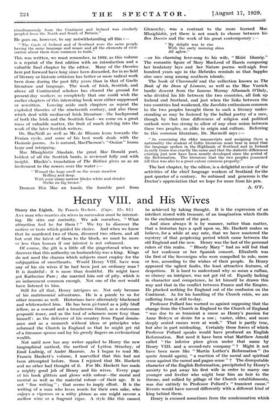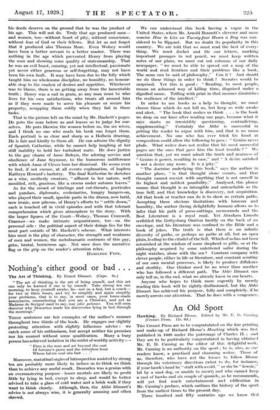Henry VIII. and His Wives
Henry the Eighth. By Francis Hackett. (Cape. 12s. 6d.) ANY man who marries six wives in succession must be interest- ing. He stirs our curiosity. We ask ourselves, " What attraction had he for them ? " We try to discover the motive or taste which guided his choice. And when we know that he murdered two of them, divorced two others, and all but sent the latest of them to the block, we must be more or less than human if our interest is not enhanced.
Of course, the gilt is a little off the gingerbread when we discover that this authority on husbandship was a king. Kings do not need the charms which subjects must employ for the subjugation of sweethearts. Would Henry VIII. have won any of his six wives if he had been just an ordinary man ? It is doubtful ; it is more than doubtful. He might have got Katherine Parr ; she married him out of pity, which is an inducement common enough. Not one of the rest would have listened to him.
Still for all that, Henry intrigues us. Not only because of his matrimonial adventures. He is a puzzle to us for other reasons as well. Historians have alternately blackened and whitewashed him. He has been pictured as a jolly bluff fellow, as a coward and a treacherous friend, as a statesman propositi tenam, and as the tool of schemers more foxy than himself : as the deliverer of his country from Papal domin- ance and as a monarch without ideas or principles who reformed the Church in England so that he might get rid of a tiresome spouse and lay his greedy fingers on ecclesiastical wealth.
Not until now has any writer applied to Henry the new biographical method, the method of Lytton Strachey, of Emil Ludwig, of Andre Maurois. As I began to read Mr. Francis Hackett's volume, I marvelled that this had not been attempted before. Soon I rejoiced that Mr. Hackett and no other had thought of it. For Mr. Hackett has made a mighty good job of Henry and his wives. Every page of his book glitters and glows with colour—the moral and mental as well as the material colour—of their age. It is not " fine writing " ; that seems to imply effort. It is the writing of a man who loves words for their own sake, who enjoys a vigorous or a witty phrase as one might savour a mellow wine or a fragrant cigar. A style like this cannot be achieved by taking thought. It is the expression of an intellect stored with treasure, of an imagination which thrills to the enchantment of the past.
And since always it is by manner, rather than matter, that a historian lays a spell upon us, Mr. Hackett makes us believe, for a while at any rate, that we have mastered the mystery of that perplexing period which came between the old England and the new. Henry was the last of the personal rulers of this realm. " Bloody Mary " had no will but that of her confessor or her Spanish consort. Elizabeth was the first of the Sovereigns who were compelled to rule, more or less, according to the wishes of their people. In Henry appeared the ugliest faults, the least attractive features, of despotism. It is hard to understand why so mean a ruffian, so clumsy an intriguer, was not got rid of. Equally lacking in character and competence, he let himself be drawn this way and that in the conflict between France and the Empire. He plucked nothing for England out of the confusion on the Continent. As for his handling of the Church crisis, we are suffering from it still to-day.
Professor Pollard has warned us against supposing that the change from the Church in England to the Church of England " was due to so transient a cause as Henry's passion for Anne Boleyn or desire for a son ; vaster, older, and more deeply seated causes were at work." That is partly true, but also in part misleading. Certainly those forces of which Professor Pollard speaks would have produced an English Reformation. But need it have been what Matthew Arnold called " the inferior piece given under that name by Henry VIII. and a second-rate company " ? Might it not have been more like " Martin Luther's Reformation " (to quote Arnold again), " a reaction of the moral and spiritual sense against the carnal and pagan sense " ? The disreputable character of the English Reformation, precipitated by Henry's anxiety to put away his first wife in order to marry one younger and livelier who might bear him an heir to the throne, and sullied by pillage of the Church establishments, was due entirely to Professor Pollard's " transient cause." Events would have moved differently with a different kind of king behind them.
Henry is excused sometimes from the condemnation which his deeds deserve on the ground that he was the product of his age. This will not do. Truly that age produced men— and women, too—without heart of pity, without conscience, without fear of God or their fellows. But let us not forget that it produced also Thomas More. Even Wolsey would have been a better servant to a better master. There was nothing in the age which prevented Henry from playing the man and showing some quality of statesmanship. That he was an evil beast, cunning, yet not intellectual, passionate yet never either generous or self-forgetting, may not have been his own fault. It may have been due to the folly which taught him no wholesome discipline, no humility, no honour- able stop to the crudest of desires and appetites. Whichever was to blame, there is no getting away from the lamentable truth : Henry was a cad in grain, as any man must be who lives for his own satisfactions, who treats all around him as if they were made to serve his pleasure or secure his property, scrapping them coldly when they fail in these tasks.
That is the picture left on the mind by Mr. Hackett's pages. He puts the man before us and leaves us to judge for our- selves. He puts likewise the women before us, the six wives, and I think no one who reads his book can forget them. Each portrait is as clear and sharp as a Holbein drawing. He is fair and kindly to them all. He can admire the dignity of Spanish Catherine, while he cannot help laughing at her stiff inability to hold her turbulent mate. He does justice to the gay charm of Anne Boleyn, the adoring service and obedience of Jane Seymour, to the humorous indifference with which Anne of Cleves bore her dismissal. He seems even to find, if not excuse, at all events explanation, of hapless Kathryn Howard's harlotry. The final Katherine he sketches as a wise, motherly creature, " affluent in her nature, well moulded, rich, gracious, like a crocus under autumn leaves."
As for the crowd of hirelings and cut-throats, poeticules and pandars, diplomats, ecclesiastics, hungry hangers-on, who played their small, ignoble parts in the drama, now lurid, now ironic, now piteous, of Henry's efforts to " settle down," each is touched off in vivid episodes and with that tolerant comprehension which gives atmosphere to the story. With the larger figures of the Court—Wolsey, Thomas Cromwell, Cranmer —we make intimate acquaintance, too—on the personal side : the political aspect of their doings lies for the most part outside of Mr. Hackett's scheme. What interests him most is the play of character, the strength and weakness of men and women, the melodramatic contrasts of this gay, grim, brutal, boisterous age. Not once does the narrative flag or the grip on the reader's attention relax.
HAMILTON FYFE.

































 Previous page
Previous page